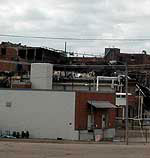By Laurel Druley
Minnesota Public Radio
July 8, 2002
On July 8, 2001, fire destroyed the Farmland Foods plant in Albert Lea. Five hundred people lost their jobs. A year has passed and company officials still have not decided whether to rebuild in Albert Lea. The company says it's waiting to hear about insurance claims. To complicate matters, about a month ago Farmland Industries filed for Chapter 11 bankruptcy. Farmland's bankruptcy has sent a ripple effect through Albert Lea, and is worrying many of the company's investors as well.
| |
|
|
|
||
On July 8, 2001, a spark from a welder's torch ignited a devastating fire that would have an impact on the whole town of Albert Lea.
That day Steve Hanson, who had worked at Farmland for 10 years, came to see the destruction for himself. As he looked at the smoldering ruins, he wondered aloud what he and his co-workers were going to do.
"Boy, I have no idea," Hanson said. "Looks like it's pretty well gutted out. I think right now they're just going to wait to see what happens here at Farmland."
The smoke and ammonia that filled the air is long gone, but the shell of a factory remains. Over the past year, many have given up on waiting and moved on. But about 150 former employees are still filing for unemployment.
While the fire brought Farmland to public attention, the blaze at the meat packing plant was the least of the company's worries. Farmland's fertilizer division had been unprofitable for some time. The Kansas City-based company, the largest farmer-owned cooperative in the country, was facing bankruptcy.
Farmland Industries filed for Chapter 11 in early June. The bankruptcy threatens the investments and savings of cooperative members and individual investors, many of whom are looking at this as their retirement fund.
At one point Farmland CEO Harry Cleberg hoped the company would grow bigger than Cargill. But some analysts say Cleberg led the company into Chapter 11.
Cooperative analysts also say few Chapter 11 cooperative bankruptcies succeed in saving the company. Most end up in Chapter 7 liquidation.
Farmland spokeswoman Sherlyn Manson says local cooperatives build equity in the company. Under ideal circumstances that equity can be cashed in sometime in the future. Manson says to date that equity is not being effected by the Farmland filing. But that could change.
"We have let our members know we anticipate there might be a cancellation of equity close to end of fiscal year on August 31," Manson says.
| |
|
|
|
||
Member cooperatives like Watonwan Farm Service in Truman have not felt the blow of the bankruptcy yet.
WFS President Ed Bosanko says he's not sure yet if the co-op will lose its equity investment of $3 million. Bosanko says WFS has reserves to cover any losses.
"It's not going to impair our ability to operate as a company," Bosanko says. "I'm frustrated with the fact that we may see the loss of one of our regional cooperatives in this bankruptcy if they're forced to liquidate. But as far as our future and ability to operate, we will continue to go on as is."
Bosanko, who has been involved in cooperatives for more than 30 years, says investors are anxious about Farmland's announcement.
"This is probably one of the more challenging things to happen within the system, but we'll continue as a local cooperative," Bosanko says. "Farmland might not be part of the future but certainly Cenex, Land O' Lakes, Ag Processing and others are viable, and will continue to service local cooperatives."
Albert Lea's future is also uncertain. People in Albert Lea have a constant reminder of the fire. Many would like the plant torn down. Albert Lea officials say property values in that area have dropped. And there is still no word on rebuilding from what was once the city's second largest employer.
Farmland has sent the city blueprints for a new plant that would employ 700 people. But the company cannot confirm its plans. Company officials need to know how much damage and loss will be covered by their insurance companies, and if the company can work its way out of Chapter 11.
More Information

